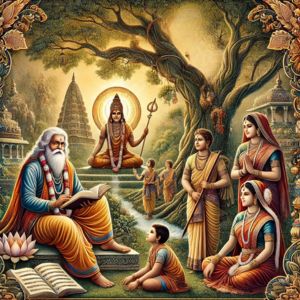The Role of Gurus in Hindu Spirituality: Guiding the Path to Enlightenment.

In Hinduism, the concept of the guru holds profound significance. A guru is not merely a teacher but a spiritual guide who imparts wisdom and helps lead the disciple on the path to self-realization and enlightenment. The guru-disciple relationship, known as the guru-shishya tradition, is central to Hindu spirituality, where the guru serves as both a mentor and a spiritual guide. This article delves into the pivotal role of gurus in Hinduism, their spiritual responsibilities, and their impact on the lives of devotees.
The guru’s role in Hindu spirituality extends beyond the transmission of knowledge. In the guru-shishya tradition, the guru is seen as a living embodiment of divine wisdom. They provide spiritual teachings, which are often tailored to the individual needs and temperament of the disciple. This personal guidance helps the disciple navigate the complexities of life, overcome ego, and reach higher states of consciousness. In Hinduism, the guru is revered as a key intermediary between the devotee and the divine, facilitating a direct connection with the ultimate truth, Brahman.
A fundamental aspect of the guru’s role is to guide their disciples in understanding and practicing the core principles of Hindu philosophy, such as dharma (righteous duty), karma (the law of cause and effect), and moksha (liberation from the cycle of rebirth). The guru teaches these principles through both direct instruction and personal example, encouraging their disciples to integrate these teachings into their everyday lives. In doing so, the guru helps the disciple evolve spiritually and progress toward enlightenment.
In the Hindu tradition, the guru is often regarded with great reverence and devotion. This respect is not merely for the guru’s knowledge but for their spiritual embodiment. Gurus are believed to possess the wisdom and power to guide individuals on a higher spiritual path, with their blessings providing the disciple with the strength and clarity needed to realize their true nature. Many Hindu scriptures, including the Bhagavad Gita, emphasize the importance of a guru in achieving spiritual progress and liberation.
The guru-disciple relationship is built on mutual trust, respect, and commitment. The disciple must surrender to the guidance of the guru, recognizing the guru as a spiritual authority. In turn, the guru must be compassionate, selfless, and dedicated to the welfare of their disciples. This dynamic creates an environment conducive to deep spiritual growth and transformation. The guru is seen as a beacon of light in a world filled with illusion, offering a path to the ultimate truth.
The influence of gurus in Hinduism is not limited to traditional settings. In modern times, many gurus have taken their teachings to global audiences, adapting their messages to contemporary issues while remaining rooted in ancient wisdom. Gurus such as Swami Vivekananda, Paramahansa Yogananda, and Sai Baba of Shirdi have made significant contributions to the spread of Hindu philosophy worldwide, impacting millions of lives across cultures and continents.
However, the role of gurus in Hinduism is not without controversy. There have been instances where individuals have misused the title of “guru” for personal gain or engaged in unethical practices. In Hindu spirituality, the true guru is expected to be beyond ego and self-interest, embodying humility, compassion, and the pursuit of truth. This highlights the importance of discernment among disciples in choosing a genuine spiritual teacher.
In conclusion, the guru plays a central role in Hindu spirituality, offering guidance, wisdom, and support to help individuals achieve spiritual liberation. The guru-shishya tradition is a cornerstone of Hinduism, fostering a deep and transformative relationship that allows disciples to understand their true nature and connect with the divine. In a world filled with distractions and challenges, the guidance of a true guru remains an essential part of the spiritual journey, leading individuals toward the ultimate goal of self-realization and enlightenment.










